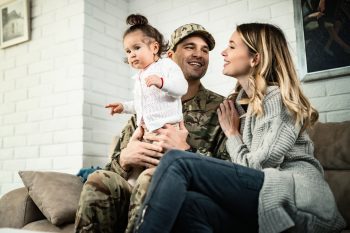Home / Health & Wellness Articles / PTSD /
Helping Heroes: Supporting Veterans’ Mental Health

Military veterans are undeniably brave and the sacrifices they make for the benefit of us all is one that can never be repaid. However, for some military service members these sacrifices can have unfortunate consequences. Some veterans develop mental health challenges, such as Post Traumatic Stress Disorder (PTSD) as a result of their wartime experiences and other military service demands. PTSD is a mental health issue that can arise after experiencing or witnessing a life-threatening or traumatic event. According to the U.S. Department of Veterans Affairs, 7% of veterans will develop PTSD at some point in their life.
When a veteran is experiencing PTSD, it is helpful for friends and family to understand the condition so they can offer support. Some veterans many not be comfortable with the idea of traditional therapy, but there are other effective ways that they can manage their PTSD. Aaron Goletz, Data Director of Centerstone’s Cohen Clinics and combat veteran, says that simply talking to a veteran about their service can be really meaningful. “Let them lead the conversation,” says Goletz “and be mindful of which questions you’re asking them.” When talking to a veteran about their service, it is important to keep the conversation lighthearted in order to avoid any potential triggers.
- “Thank you for your service”
- “What branch were you in?”
- “What was your job?”
- “Do you have any fun or interesting stories to share?”
It is important to steer clear of questions like “did you lose a friend in combat?” or “did you see anyone die?” This rush of unpleasant memories could trigger an adverse reaction.
Veterans experience trauma in many forms, and not all of it is related to combat. Since we are moving into an era where less and less military members are being deployed to active combat zones, more veterans are speaking up about trauma they have as a result of overall military service.
If a veteran finds themselves experiencing a flashback or trigger, there are things they can do like deep breathing, chewing gum or taking a drink of cold water can help them recover from an intense emotional response. These techniques, called grounding exercises, can be incredibly helpful for someone who is working through their PTSD.
Being involved in local veteran groups can be beneficial as well. “They may not even realize this, but talking with other veterans about their experiences can have similar impacts as a support group,” says Anna Goletz, Director of Military Services at Centerstone. As a veteran, so much value can come from talking with others who have the same lived experience as you, since they have a much better understanding of what you may be feeling.
Though having conversations, recalling memories, and utilizing grounding techniques can all be great tools to help process PTSD, Anna Goletz recommends that all of these tools be used in addition to professional counseling.
PTSD can be difficult to navigate alone, but support and veterans-specific resources are available. Whether you have experienced trauma from a combat experience, or military life in general, Centerstone can help. Call us at 877-HOPE123 (877-467-3123) or visit our military services page.


